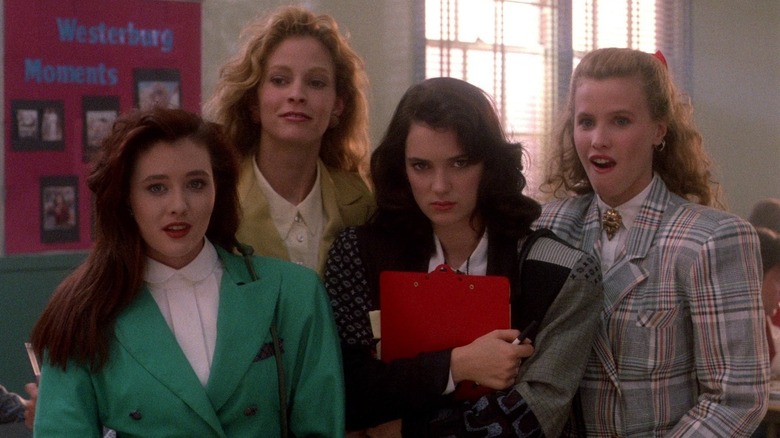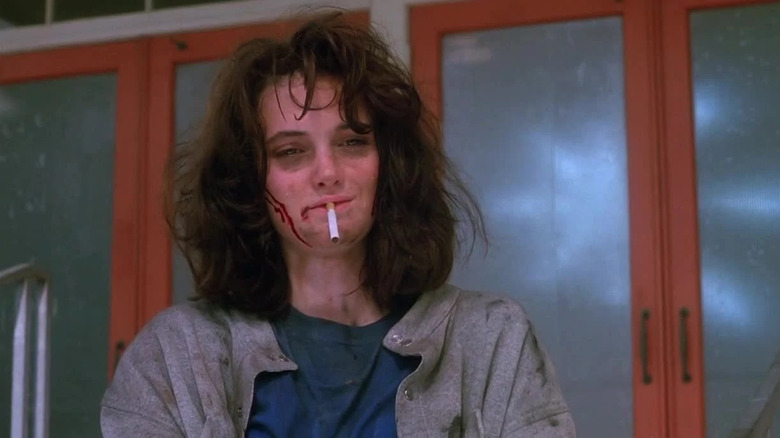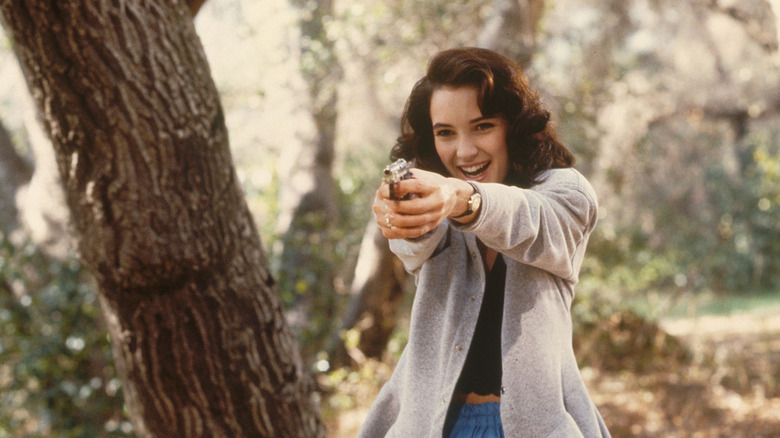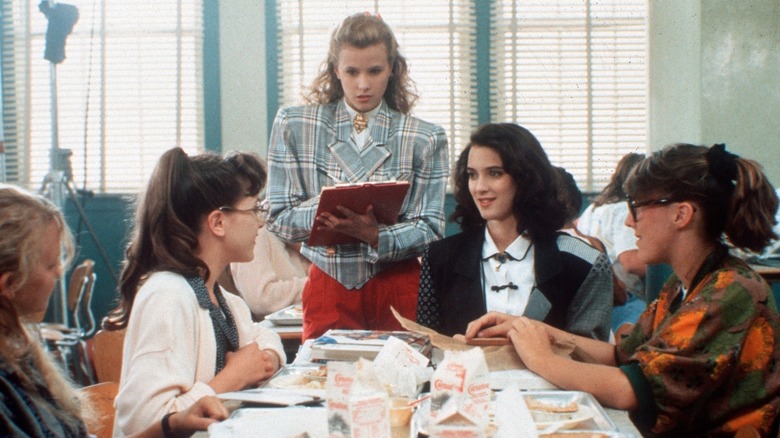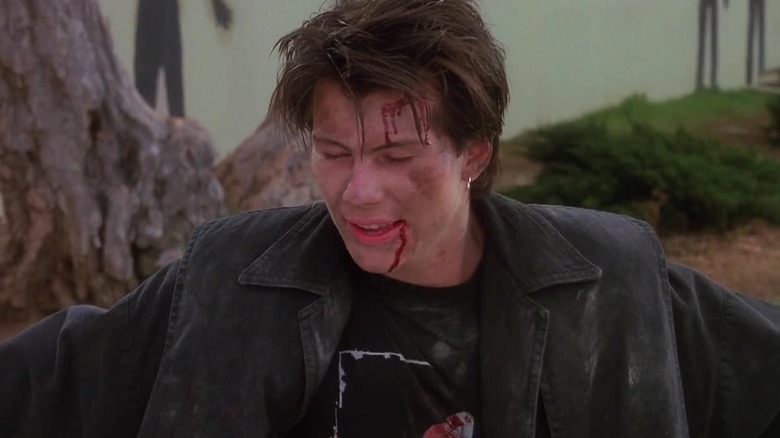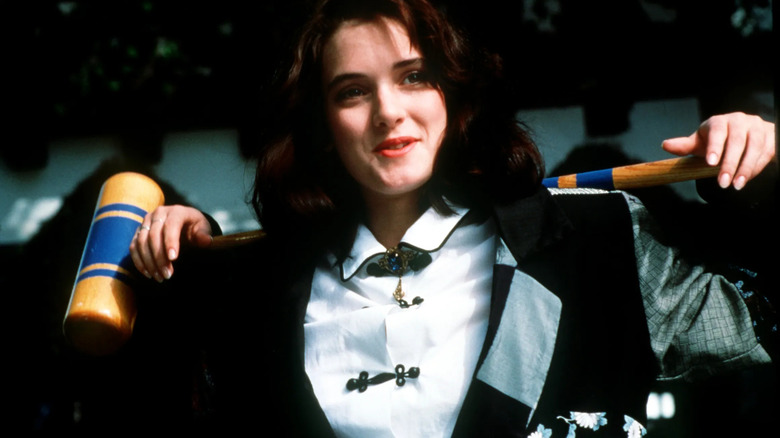Heathers Ending Explained: There's A New Sheriff In Town
The ending of the 1988 black comedy "Heathers" obliterates the social hierarchies of high school. After J.D.'s plans to blow up the school during the pep rally are thwarted by Veronica, he follows her to the steps of Westerburg High School and sacrifices himself for his anti-clique ideology. Veronica rejects his pretentious worldview and manipulative ways as she calmly watches him die by suicide. When Veronica steals the red scrunchie from Heather Duke and puts it in her disheveled hair, this symbolizes the downfall of the Heathers' rule. "Heather my love, there's a new sheriff in town," she says, effectively knocking the Heathers off the top of the social pyramid.
"Heathers" was considered a flop during its theatrical release, earning $177,247 on its opening weekend and only $1 million at the box office over the course of five weeks (via Box Office Mojo). However, it developed a cult following on VHS and is now considered one of the most subversive teen films. It has incinerating lead performances from Winona Ryder and Christian Slater as the dangerous Bonnie and Clyde-esque duo and scathing dialogue that reveals the dark side of adolescence.
School is hell
J.D. wants to destroy the homophobic jocks and snobby queen bees who make everyone's lives miserable — especially those who do not fit traditional beauty standards. One of their objects of ridicule is a plus-size girl they nickname Martha Dumptruck, someone who "was dialing suicide hotlines in her diapers!" They play a trick on her to make her think that Martha received a love note from one of the jocks. The popular kids in "Heathers" are shallow and cruel — even towards one another, as in the scene where a jock drunkenly forces himself on one of the Heathers while Veronica and J.D. have a casual conversation.
"Heathers" depicts their viciousness and pecking order in such an over-the-top way that you can't help but laugh. The ending where J.D. attempts to demolish the school matches the film's morose, satirical tone. He wants to frame the explosion as a mass suicide, even forcing the students to unwittingly sign a suicide note by disguising it as a petition. "The only place different social types can genuinely get along with each other is in heaven," J.D. declares. In his twisted mind, a communal death is the only way to resolve the split between the high school haves and the have-nots.
But Veronica proves this isn't true when she genuinely invites Martha to spend time with her on prom night watching movies from the video store. The final image of Veronica and Martha circling each other in the school hallway is one of acceptance and potential friendship — a kernel of hope in this overall bitter portrayal of teen life.
Alternate endings
Writer Daniel Waters had three alternative ending ideas for "Heathers." In one of them, J.D.'s mission is successful and the school explodes, allowing the teenagers to harmoniously enjoy their prom in heaven. According to the director Michael Lehmann, "the [New Line] executives just said, 'No way. We can't make a satirical movie about teenage suicide in which the people actually kill themselves'" (via Entertainment Weekly). Although this bleak ending would infer that death is the answer to bullying and social exclusion, it would have been intriguing to see that vision come to life.
Yahoo! reports that Waters originally gave the studio an even darker ending "where [Veronica] kills J.D. in the boiler room, walks away from the high school, turns around, and she's wearing the bomb. So she blows herself up to save the sins of the high school." But the screenwriters' favorite alternate ending features Martha replying to Veronica's prom night invitation by stabbing her and calling her a Heather. The last shot would have left Veronica bleeding on the ground and spitting out, "My name's not Heather, you b****!"
All of these endings would have pushed the cynicism of "Heathers" over the edge, especially if Veronica wanted to help J.D. decimate the school or die by suicide herself. Although she shares J.D.'s contempt for the sadistic social order, there's more value in the final version where she realizes that Westerburg High School can find hope in genuine kindness.
Impact on teen films and TV shows
"We really wanted to make the teen film to end all teen films," Winona Ryder told Interview Magazine. "Heathers" certainly was a nail in the coffin for the romantic sentimentality of John Hughes' teen films. These beloved coming-of-age stories have mean girls and bullies, but the underdog always prevails and there is a general optimism. Even the nastiest characters in John Hughes' films would never flippantly pronounce, "Well, f*** me gently with a chainsaw."
"Heathers" had a ripple effect on films and television shows that confront provocative teenage problems. The characters in "Cruel Intentions" live up to the film's title, using their wealth and privilege to manipulate those around them in matters of love and sex for their own amusement. The Plastics in "Mean Girls" are just as cutthroat and image-obsessed as the Heathers, and they mercilessly enjoy gossip and backstabbing.
The influence of "Heathers" can be felt in the superficial Upper East Side characters in "Gossip Girl." They will destroy others' reputations in order to preserve their own social status and desires. A dark twist on the classic and wholesome Archie comic books, teenage life in "Riverdale" includes murder mysteries and lurid sexuality. "Heathers" helped the teen genre evolve into something meaner and more controversial, and give its humor a lot more bite.
Heathers for a new generation
Watching "Heathers" today can be unsettling, especially when J.D. wanders around the school in his Columbine-style trench coat and whips out a gun in the cafeteria. "The extreme always seems to make an impression," he boasts, a line that feels like peering into a crystal ball. We're now in a world where death at school is a very real possibility — even for elementary students. Americans cannot go to the grocery store, Independence Day parades, nightclubs, movie theatres, or concerts without worrying about destructive nihilists like J.D. taking their anger and isolation out on society.
Such awful realities contributed to the failure of the "Heathers" television series on the Paramount Network. It was set to premiere on March 7, 2018, but kept being delayed after the Stoneman Douglas High School and Santa Fe High School shootings. Deadline reports that numerous changes were made, including the removal of the school explosion and "the content in a first-person video game, originally featuring teachers holding guns." After the Pittsburgh synagogue shooting on October 27, 2018, episodes seven and eight were not broadcast.
/Film contributor Lindsey Romain critiques the misguided "Heathers" show: "It mocks body positivity. It mocks queer identification. It sympathies with its new Veronica, a pretty blonde girl who struggles to get into college because she isn't 'different' enough." Audiences did connect to "Heathers: The Musical" which "tackle[s] supremely dark issues, like bullying, teen suicide, sexual assault, fatphobia, classism, mental illness, and school violence" but in a campy style that resonates with younger audiences more than dark realism. Sadly, we'll never see the "Heathers" sequel that Daniel Waters conceived for Veronica to work for a senator named Heather and assassinate a president.
A time for Heathers
"It's funny what a morbid 24-year-old I was when I wrote this," Daniel Waters remarks in Variety. He addresses something very true about "Heathers": your age changes your perspective on the film. "Heathers" rejects the nostalgia for our teen years and shows the pain there often can be, especially when you are on the wrong end of the social divide. Yet, in light of adult realities, J.D. and Veronica's anger towards their school's caste system doesn't hit as hard. There is so much more to life beyond cafeteria walls.
Our view of "Heathers" has especially changed over the decades. "Heathers" feels like a film lost in time. It took a while to find its audience after its 1988 release, and while the "Heathers" legacy echoes in our current teen films, and there is a new appreciation for the film thanks to the musical, it is difficult to enjoy its black humor in a time period when death is very much a reality for students — not only by gun violence but also by the increase of bullying via social media.
Everyone feels uncomfortable and insecure during high school, even the most popular person; "Heathers" captures those feelings with a razor-sharp edge, but it's a film you have to be careful with nowadays or you'll get nicked.
